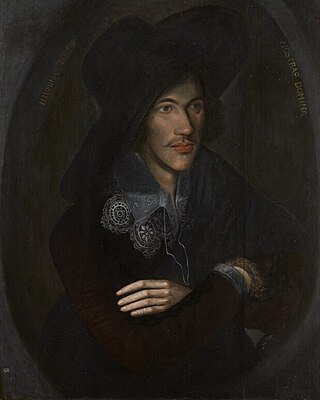約翰·多恩(又譯鄧約翰;英語:John Donne,1572年—1631年3月31日)是英國詹姆斯一世時期的玄學派詩人,他的作品包括十四行詩、愛情詩、宗教詩、拉丁譯本、雋語、輓歌、歌詞等。
生平

出生於倫敦的一個羅馬天主教家庭,爸爸是威爾斯人後裔。母親的親戚托馬斯·莫爾因天主教而殉難,也有許多近親因而遭受迫害,弟弟亨利也因宗教原因被監禁,並被殺害。然而,約翰是家族中唯一放棄天主教並改信英國國教的人。他曾在牛津大學哈特堂學院(Hart Hall,今牛津大學赫特福德學院)和劍橋大學學習神學、醫學、法律和古典文學,但均未獲得學位。1598年,多恩被任命為伊格頓爵士的私人秘書。1601年,他秘密同伊格頓夫人的侄女結婚。儘管婚姻愉快,多恩卻因此獲罪,失去了職位,並遭監禁。出獄後十數年間,生活艱苦,並暫時生活於朋友的庇護下。後因撰文攻擊天主教、維護王權而獲得詹姆斯一世的賞識,於1615年成為王室牧師,1621年出任聖保羅大教堂教長,是當時最著名的傳教士,直到1631年去世。[3]
作品風格
約翰的詩起初常包含對英國社交界的尖銳批判。他認為人們應仔細考慮宗教信仰,而不是盲目地遵循傳統,他曾經說過:「A Harry, or a Martin taught [them] this」指出是聖人告訴我們要相信神,並主張審判是無法挽救人的。而且他早期有許多悲情詩含有情色內容。《跳蚤》也是其中之一。鄧約翰在生前雖沒有出版這些詩歌,卻有將其詩的手稿廣泛向世人傳播。
約翰後期因生病、經濟貧困和朋友的死亡,而使其詩增添了陰沉的基調。從他的宗教相關作品中可以明顯看出這一點。改信英國國教後,約翰的文學作品也多與宗教有關。他充滿感染力的講道方式與宗教詩歌隨即受到肯定。約翰去世前,基於他的信仰主張,寫了許多挑戰死亡的詩,他認為死者被送到天堂是為了永遠活著。一個廣為人知的例子是Sonnet X也就是Death be not proud。 [4] [5]
延伸閱讀
- Bald, R. C.: Donne's Influence in English Literature. Peter Smith, Gloucester, Massachusetts USA, 1965
- Berman, Antoine. Pour une critique des traductions: John Donne [Towards a Translation Criticism: John Donne]. 由Françoise Massardier-Kenney翻譯. Paris: Gallimard. 1995 (法語).
- Carey, John. John Donne. Life, Mind and Art. London: Faber and Faber. 1981. Revised and republished 1990.
- Colclough, David. John Donne's Professional Lives. DS Brewer. 2003. ISBN 978-0-85991-775-9.
- Grierson, Herbert J. C. (編). The Poems of John Donne. Oxford: University Press. 1902. In two volumes
- Guibbory, Achsah (編). The Cambridge Companion to Donne. Cambridge: University Press. 2006.
- Jessopp, Augustus. Donne, John (1573-1631). Dictionary of National Biography. London: Smith, Elder & Co. 1885–1900.
- Le Comte, Edward. Grace to a Witty Sinner: A Life of Donne. Walker. 1965.
- Stephen, Leslie. John Donne. Studies of a Biographer. London: Duckworth and Co. 1898: 36–82.
- Lim, Kit. John Donne: An Eternity of Song. Penguin. 2005.
- Morrissey, Mary. Politics and the Paul's Cross Sermons, 1558–1642. Oxford: OUP. 2011. ISBN 978-0-19-957176-5. doi:10.1093/acprof:oso/9780199571765.001.0001.
- Stubbs, John. John Donne: The Reformed Soul. Penguin Books Limited. 2007. ISBN 978-0-14-190241-8.
- Sullivan, Ceri. The Rhetoric of the Conscience in Donne, Herbert, and Vaughan. Oxford: University Press. 2008.
- Warnke, Frank J. John Donne. Twayne. 1987. ISBN 978-0-8057-6941-8.
- 《英国玄学诗鼻祖约翰·但恩诗集》(傅浩 譯) (PDF). 北京十月文藝出版社. 2006年8月. (原始內容存檔 (PDF)於2021年).
參考資料
Wikiwand - on
Seamless Wikipedia browsing. On steroids.

